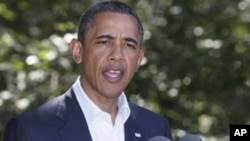U.S. President Barack Obama said Monday that Libya's people are within reach of the future they deserve as the 42-year rule of Moammar Gadhafi comes to an end. The president spoke in Martha's Vineyard in Massachusetts where Mr. Obama is vacationing with his family.
In his statement, the president said the situation remains fluid, but that it is clear Libyans are on the verge of attaining the future they desire. "There remains a degree of uncertainty and there are still regime elements who pose a threat. But this much is clear, the Gadhafi regime is coming to an end and the future of Libya is in the hands of its people," he said.
|
The Libyan Rebellion
|
Mr. Obama said he had just met with his national security team, and spoken by telephone with British Prime Minister David Cameron.
Celebrations in the streets of Libya, he said, show that the pursuit of human dignity is stronger than any dictator. But President Obama cautioned that as the Libyan government collapses, certain elements threaten to prolong the fighting. "Although it is clear that Gadhafi's rule is over, he still has the opportunity to reduce further bloodshed by explicitly relinquishing power to the people of Libya and calling for those forces that continue to fight to lay down their arms for the sake of Libya," he said.
Looking ahead, Mr. Obama called on the Transitional National Council, or TNC, to continue taking steps to bring about a "peaceful, inclusive and just" transition. He said the United States will support the TNC with Gadhafi government assets that were frozen earlier this year.
Mr. Obama said the United States, NATO and other partners will continue to help safeguard Libya's people as what he called "remaining regime elements" menace parts of the country.
The president also addressed Americans for whom he said events in Libya have a particular resonance, noting the murder of scores of Americans in acts of terror sponsored by the Gadhafi government.
For NATO, Mr. Obama said the Libyan intervention, with help from Arab states, proves that the alliance is the most capable alliance in the world and demonstrates what the international community can achieve when it stands as one.
The president directed this remark to the Libyan people. "An ocean divides us, but we are joined in the basic human longing for freedom, justice and for dignity. Your revolution is your own, and your sacrifices have been extraordinary. Now, the Libya you deserve is within your reach," he said.
Mr. Obama said that although "huge challenges" remain, events in Libya are a reminder that "fear can give way to hope and that the power of people striving for freedom can bring about a brighter day."
In other developments, Secretary of State Hillary Clinton spoke with TNC chairman Mustafa Abdul Jalil, discussing efforts to assemble an inclusive new government.
Clinton also spoke with Jeffrey Feltman, the State Department's chief Middle East diplomat who just completed a visit to the eastern Libyan city of Benghazi, and with the U.S. envoy to the TNC, Chris Stevens.
Officials of the international "Contact Group" on Libya, including foreign ministers of France, Italy, Germany, Turkey, Norway, Sweden, Canada, Denmark, United Arab Emirates, and officials of Qatar and Britain are scheduled to meet Thursday in Istanbul to coordinate next steps on Libya.















